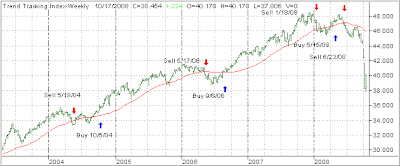 This is not headline news, but the stock market is so bad that VP Cheney has invited his stock broker for a hunting trip…
This is not headline news, but the stock market is so bad that VP Cheney has invited his stock broker for a hunting trip…
While that can’t really be verified, there’s probably some truth to the fact that many investors feel that way.
Below are some words of wisdom and insights from Al Thomas, author of the book “If It Doesn’t Go Up, Don’t Buy It!”
As always, Al’s unique style does not belie the fact that he’s one of the few who knows what he’s talking about, since he’s experienced it all in his long investment career. Here’s his take on the nonsense of value investing:
VALUE INVESTING EQUALS NONSENSE
No one needs talk about the condition of the stock market today. In a word it stinks.
So many people have been watching their 401Ks decrease in value they won’t open their statements. They better get their heads out of the sand and take charge because the current money
mangler (and I didn’t misspell that) doesn’t know what he is doing.
Fund managers are mesmerizing their customers (yes, you are just a customer even though they give you fancy names like investor, client, shareholder) with 10-year performance records.
Such B.S.! Who cares what happened 10 years ago. What have you done for me lately?
Brokers, money managers and so-called financial planners all seem to have learned how to lose money. 99% of them have no clue on how to protect a customer’s money.
The latest talking point you can hear on all the financial TV channels is “value investing”. Various mavens, economists and other experts want the poor investor (getting that way more so every day) to look at the quality of the stocks in their portfolio.
What quality? It doesn’t make any difference how good (?) a company is if the price of the stock goes down. One of the great quality stocks also known as a defensive issue because it is in a group that is not supposed to decline during a bear market is the Kellogg Company. It just fell off the table dropping from 57 to 48 in a week. That’s 15%. If you were a boxer you’d be lying on the canvas.
All the conversation about the value in the corporate balance sheet is nonsense if the stock is losing. Their value formulas must have been made up by Mickey’s friend Goofy. VALUE INVESTING EQUALS NONSENSE!
There is one way to tell value. Is the stock, ETF or mutual fund is going up? That is all any investor needs to know. The rest is smoke and mirrors. When there is a loss of more than 10% of value it is time to sell. At least Mr. Investor will have 90% of his money. When looking at the statement today he would immediately say I’ll take that 10% loss just give me back the difference. Sorry, Bud, it won’t happen.
None of these geniuses have been trained to protect client’s money with very simple stop loss techniques. None of them have been taught how to sell. None of them (well, 99%) have any exit strategy.
Has the investor ever asked his manager (sorry, mangler) to explain his exit plan to protect customer money? Probably not. Wall Street does not teach any of these clowns asset protection. It is all long term and sweat it out. Yeah!
Better get on the phone and ask why these “safe” mutual funds have lost so much and does he have a plan to make it back. How about a plan not to lose any more? See what kind of nonsense answer that will bring. How about asking for a guarantee. Fageddaboutdit.
It is your money. Since the money manager is not managing it then you better take over to be sure there is value when you need the funds.
There are very few investment professionals in this country who I agree with. Al is right on with this story, and I hope that his view point enables you to see through the BS that is being dished out on a daily basis by the media as well as the talking heads on the financial news shows.





